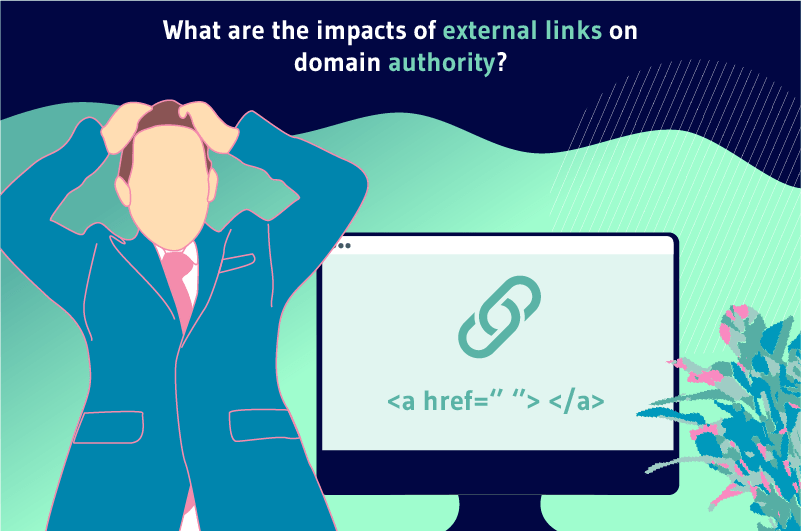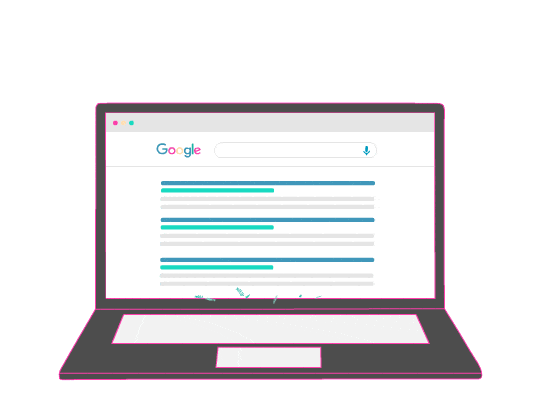According to a Moz study, data shows a very strong correlation between links and the authority of a website, therefore, on its ranking.
So naturally, focusing on external links is a good goal to increase your ranking in the SERPs.
Just as external links can help raise your website’s authority, they can also impact it in the opposite direction.
To that end, I invite you to take a look at the effects of external links on your domain’s authority and how you can do it.
Chapter 1: What is an external link?
In this chapter, let’s discover the basic concepts of an external link.
1.1. External link: What is it really?
Links are considered external when they point to a domain other than the one on which they are placed.
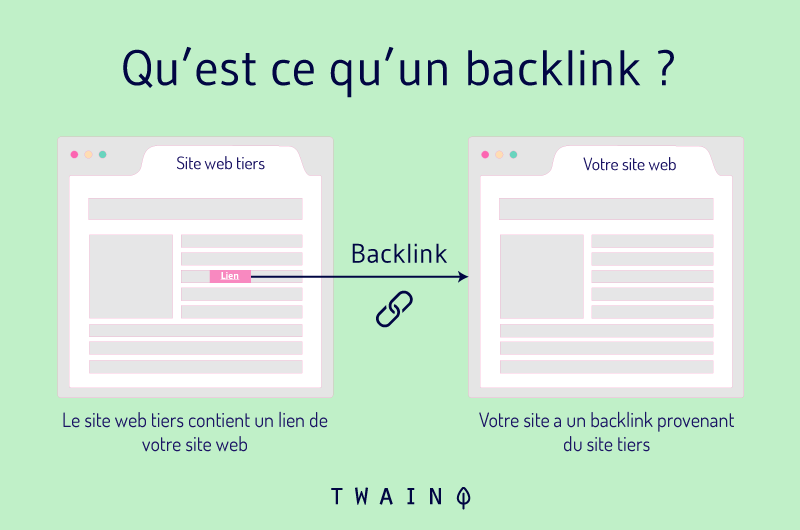
Otherwise, outbound links are HTML codes on your site that redirect site visitors to other sites so that they can find out more about the topic or verify the source of your information.
Similarly, when you have two different websites and you add a link that connects the two, it will also be considered an external or outbound link.
For many people, external links are not intuitive enough due to their nature of redirecting the reader who may convert into a potential customer to another website.

However, external links from trusted sources also give you authority and allow search engines to better understand the subject matter of your content to better rank it.
This way, when you provide reliable and informative content, other websites will link to your content, which makes you gain authority.
Just note that any time people can click on a link on a site that takes them somewhere else, especially outside of your site, it is called an external link
1.2. The different types of external links
There are generally four main types of external links that we will discover:
1.2.1. Inbound links
Sometimes called external links or backlinks, inbound links direct users from other websites to your website.
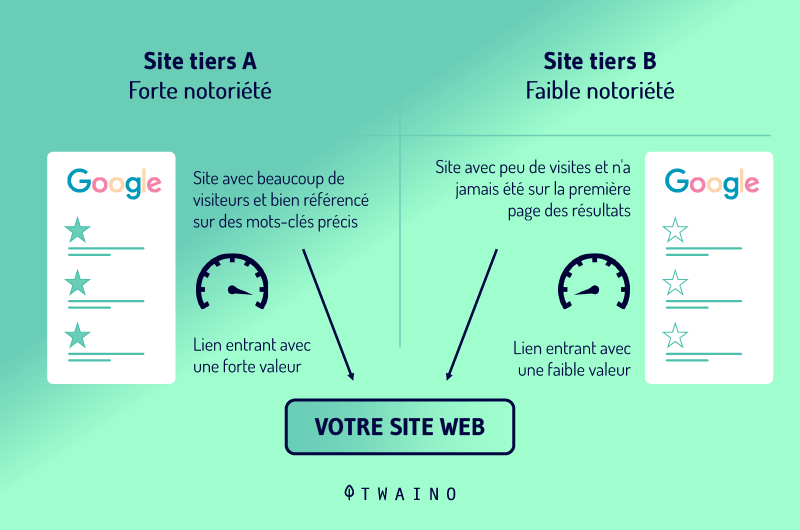
Inbound links are the most important type of link and should be an essential pillar of any SEO strategy, as they are a pretty important indicator for your online brand.
First, Google sees inbound links as votes of confidence and popularity that indicate your brand is a trusted and recognized authority.
When someone mentions your site in their own content to support their ideas, it means that person trusts your site
For a backlink to be valuable, it must come from a prominent and authoritative site according to Google’s Webmaster Guidelines.
Your site will rank higher in Google and other search engines. To support this, a Backlinko study found that sites with more backlinks rank higher in Google.
- Google finds new pages on sites with backlinks faster and easier. Even though Google can crawl the entire web in a short period of time, it is best guided by page to page links;
- Inbound backlinks are often the best way for targeted users to find your business. Without backlinks, those valuable prospects may never have made it to you.
1.2.2. Outbound links
Like inbound links, outbound links direct users of your website to other sites on the Internet, usually to acquire more information. Only that your site is not the source in this case
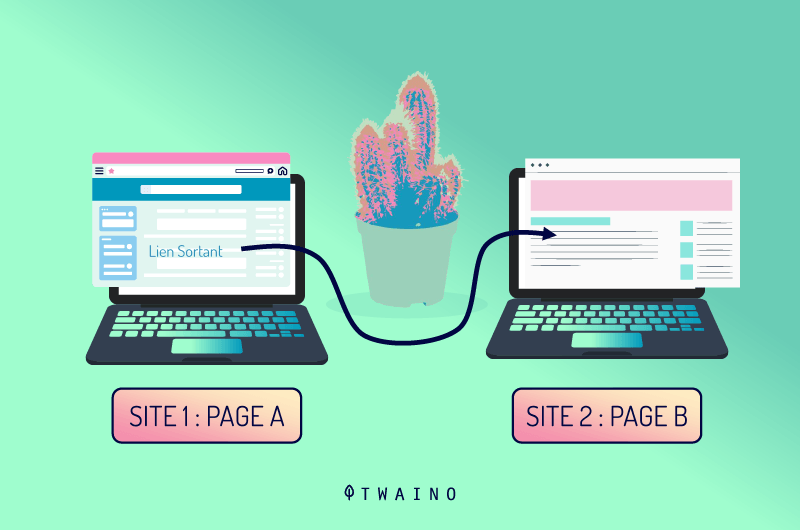
Most often, outbound links are provided to verify facts or reference sources.
In a recent Q&A session hosted by Google, John Mueller said that outbound links are a great way to provide value to users.
He didn’t mention SEO in this video. But we can deduce that if content quality is king in SEO, an outbound link that provides value and improves the quality of content for the user should improve SEO
Furthermore, outbound links help structure the web and gain the trust of search engines. When you link to legitimate, high-quality sources that are authoritative according to search engines, you appear to be perfect in your field
As far as users are concerned, they will be able to rely on you for better information. Whenever they need it, they will not hesitate to come back to your site.
In the same way, outbound links can scare away your visitors and harm your SEO when they refer to spam sites for example.
1.2.3. External Nofollow links
An external link is called Nofollow when it points from one website to another, but with the attribute rel=”nofollow”
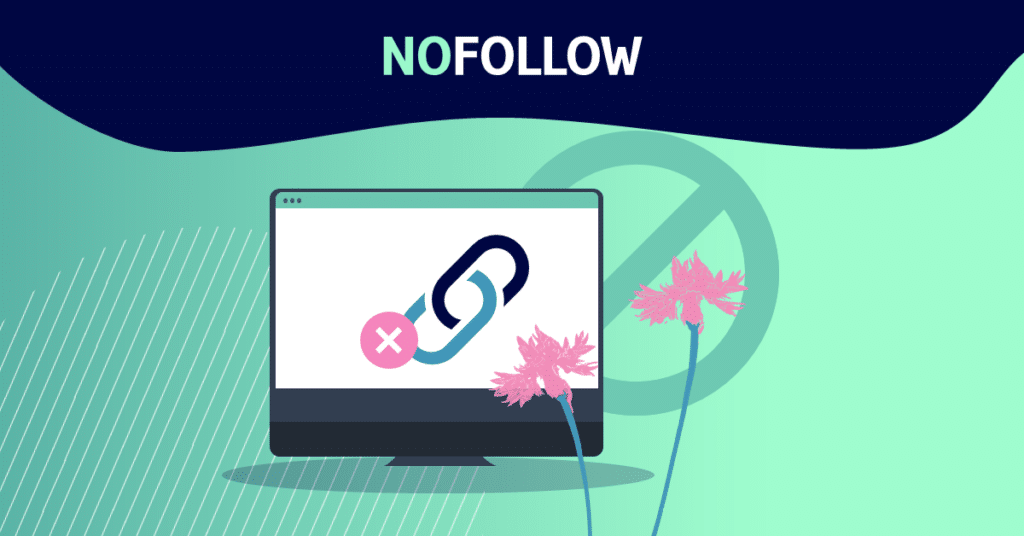
This tag of HTML nature recommends to search engines to ignore this link and that you do not want to give it PageRank.
Nofollow was introduced in 2005 by Google following the increase in spam in the comments of posts on a website
Some website owners were leaving links to their own sites in the comment sections of other websites or external forums.
In return, they were getting higher rankings regardless of the relevance and overall quality of the comment they leave
Bing and Yahoo also supported the idea and started treating the rel attribute values in the same way as the web giant
From 2005, the nofollow worked as a guideline and search engines did not explore this type of link at all
This stopped some manipulations, but did not completely solve all the problems with the different types of links and the values given to them
In 2019, Google changed its perspective on nofollow links, making nofollow an index by introducing new attribute values
This means that even if the link is nofollow, it can still be crawled and included in the ranking process to consolidate the amount of external links
The new values, rel=”sponsored” are for paid partner links and rel=”ugc” are meant to be used for links left by users. They can be used separately or in combination with rel=”nofollow”:
Despite this, nofollow links obviously prevent the authority or PageRank of one website from being strongly passed on to the other despite being linked.
Generally the nofollow tag is assigned necessarily to certain types of links such as:
- Paid links ;
- Affiliate links;
- And links to product pages.
The simple reason is that these types of links are of potential revenue generating nature and therefore Google recommends not to follow them by default
But when you don’t add the nofollow tag to these types of links, you may lose your credibility with the search engine and your website will experience a rather remarkable drop in ranking.
It should also be noted that the use of the nofollow tag helps to prioritize and enhance the crawl of the search engine spiders.
It also allows search engines to recognize which pages you want them to crawl and which ones they should ignore.
1.2.4. Dofollow external links
The Dofollow link is the default state of the HTML attribute that is used to allow search engine spiders to follow links.
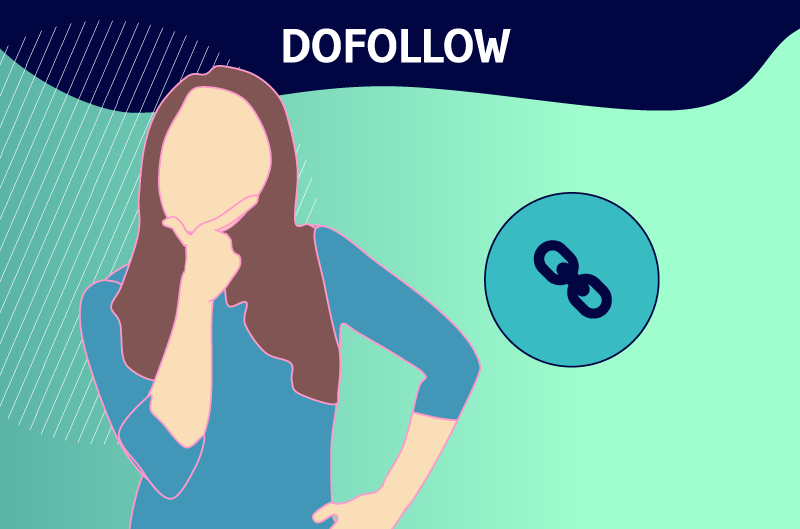
The Dofollow link acts as a link that users can click on and navigate to other web pages or websites.
Unlike external Nofollow links, a dofollow backlink tells spiders or bots to follow that link and pass on PageRank to it.
When another website links to another website with a dofollow link, it can directly affect search engine rankings.
1.3. What is the difference between external and internal links?
As you already know, external links are links you use on your website that link to other websites on the Internet
In general, these links:
- Refer to pages with content similar to yours
- Redirect to pages whose content is related to your products and services;
- Or lead to pages that are in some way related to your business
Depending on the situation, you may even find that you occasionally link to competitors’ pages
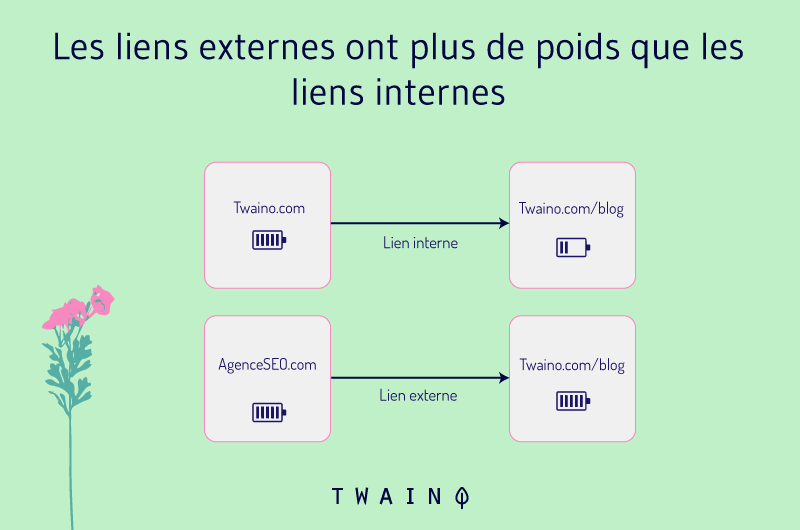
The pages your links lead to may be those of other bloggers or small businesses, or they may be websites of large companies
For example, if you run a pet blog, you can link to other pet blogs, social media pages of famous dogs or big names in the pet industry.
Creating external links builds your reputation and the reputation of other websites you link to.
Internal links work almost the same way, except here the authority you are trying to build is uniquely yours
When you create an internal link, you are linking to a URL on your own website that provides more information about the topic you are talking about.
1.4. External Backlinks & Pagerank
It is probably impossible for Google’s human engineers to manually organize the order in which web pages should appear for each of the 5 billion+ searches performed daily.
And for that, the web giant has to use algorithms to decide which pages are most relevant per search.
Page Rank, also called Link Equity, is an algorithm designed by Google to judge the popularity of a web page.
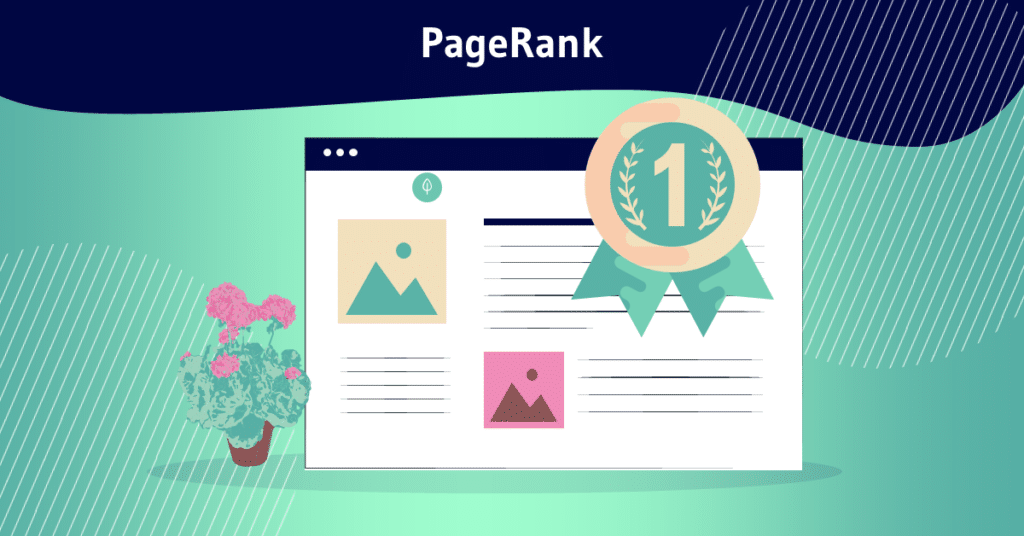
During the indexing process, Google counts the number of external links that point to the page and evaluates this information according to its algorithm. It then assigns the page a ranking score from 0 to 10, and this is called PageRank or Authority.
Logically, web pages that are fairly reputable and popular have more external links pointing to them. When Google looks at the links pointing to your page, it also looks at how important those pages are
And if the pages that redirect to your site have a high page rank and are relevant, your chances of having a higher page rank improve
That said, the more links you have from poor quality, mediocre pages pointing to your site, the lower your page rank will be
In fact, while it’s important for sites to link to your content, it’s ideal to have links that are relevant and have a strong reputation.
Chapter 2: External links and SEO
There is no doubt that your external link profile has an influence on your search engine ranking.
Since inbound and outbound links are not the same, the impact of each on your SEO can be distinctive.
2.1. Inbound links & SEO
Every webmaster should strive to have their site seen as an authority in their market
The more you can get other sites to notice and recognize your site as an expert source, the better your site will be when users enter search terms related to your market.
You should note that quality always trumps quantity. So getting a lot of backlinks out of context is not going to help your business
In fact, you could end up being penalized by many search engines for getting too many external links from unreliable sources. The same goes for sites that buy backlinks, an old black hat SEO strategy.
External SEO links from other sites represent a vote of confidence in your site’s relevance to topics of interest to visitors.
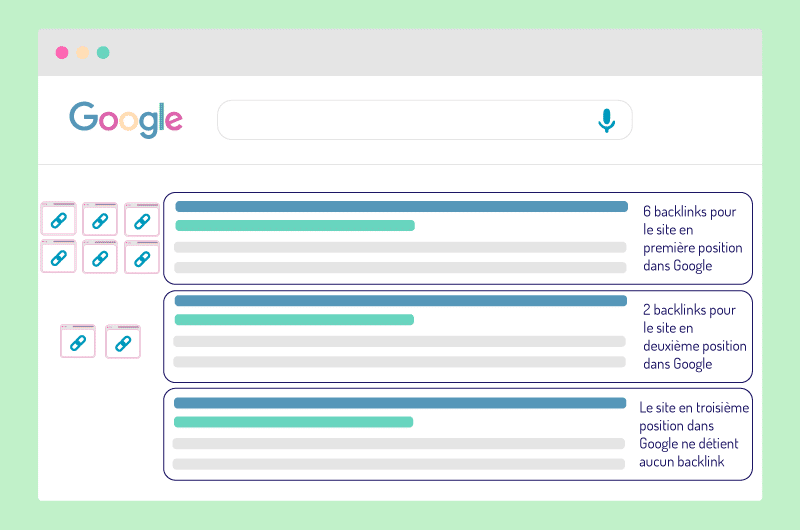
The reputation of the person making the recommendation plays an important role in whether or not someone finally follows up on the communication. The same philosophy applies when you get backlinks from highly ranked websites.
2.2. Outbound links & SEO
It’s important to remember that both inbound and outbound links are important for SEO
Just like with inbound links, quality takes precedence over anything else. If you are citing statistics to back up claims about a specific topic, the accuracy of your external link source is very important
It must confirm everything you wrote and not mislead visitors. The more consistently you provide a quality outbound link from your content, the more search engines will view you as an authoritative source
Outbound links provide search engines with context for your content and provide readers with additional resources on specific topics.
Outbound links do not distract or detract from your page. They add more weight and value to your content while reinforcing signals around your topic
This improves your search engine rankings when users search for information on topics related to your content.
Having on-page content with outbound links builds reader confidence. They know you are providing them with the most accurate information possible
2.3. Dofollow backlinks & SEO
When we talk about the value of links for rankings, we are directly referring to outbound links and inbound links
As you probably already know, search engines rely on over 200 factors to rank pages in SERPs and high quality backlinks are among the top two ranking factors.
When a link is followed, it means that all the SEO benefits the link provides are shared between the two linked websites.
The more links you receive, the greater your website’s ability to discuss top spots in the SERPs.
Backlinko goes back to this by stating that pages ranked first in Google have 3.8 times more backlinks than pages ranked 2nd to 9th
This suggests that the number of links received is important and has an impact on rankings in a more nuanced way than just quality
2.4. Nofollow links & SEO
Websites aim to get as many tracked backlinks as possible, and that makes perfect sense
But it’s also worth getting nofollow links, as they can increase
Your traffic
- Your brand awareness; and
- Your rankings;
- More link building opportunities.
Even though Google may not like the ranking of a page with this type of link, it is likely to bring you high quality referral traffic
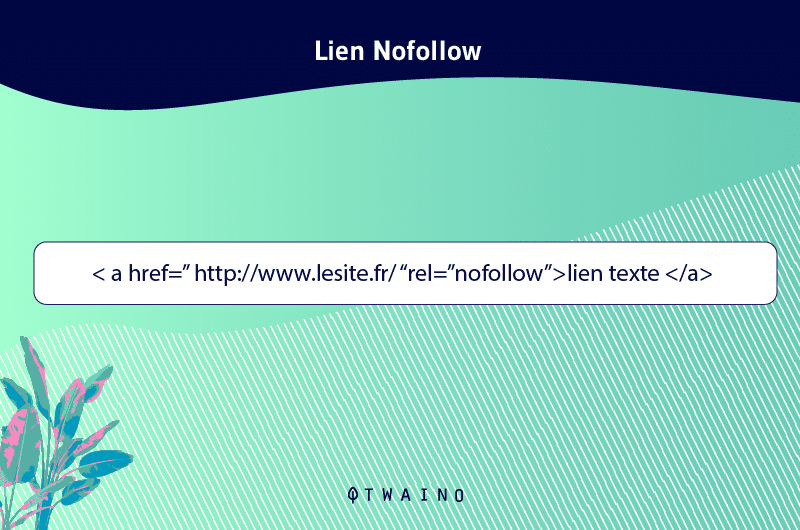
That’s why we do SEO in the first place, to get the right eyes on your products or services.
Nofollow backlinks can improve your SEO in the following ways:
2.4.1. They have a direct impact on rankings
Since Google considers nofollow as an index, it can track the nofollow link and include it in the ranking calculations. This is what a recent study by Ahrefs revealed.
This study sought to see the correlation between backlinks from sites with traffic and the ranking of a site. Unexpectedly, dofollow links had a low correlation with a site’s ranking and the number of links won out with a significant correlation.
This means that some no-follow links are treated as positive ranking signals more than some followed links. It is obvious that links from authoritative sources, regardless of their attribute values (dofollow or nofollow), do your website good.
However, there is much less information about how Google’s algorithms perceive rel attribute values. But when considering other search engines, it becomes clear that nofollow links may be even more valuable
They often emphasize the importance of relevant and useful backlinks without worrying about whether they are followed
For example, Bing recommends getting quality links from a website that Bing already knows and trusts.
As for the search engine, it simply states that links from high quality sites are the best way to get a good ranking
2.4.2. They generate traffic and increase awareness
The nofollow tag does not affect traffic and nofollow links placed on popular sources will certainly receive clicks from visitors.
If the linked source seems interesting and useful for the context, users will visit it and eventually navigate to other pages of the website.
2.4.3 They help to create a natural backlink profile
Nofollow links help you have as natural a backlink profile as possible and show that you are not trying to fool Google by getting links in an unconventional way.
In addition, the dofollow only backlink profile will arouse the suspicions of search engines, as it may appear that all links are paid for and accepted instead of being earned by the quality of the content itself.
2.4.4 They give the opportunity to get dofollow backlinks
The more links a website receives in general, the more recognition it gets from users and SEOs. When you develop your backlink profile with nofollow links, your chances of being followed increase.
2.5. What does Google think about nofollow links?
When faced with the question of nofollow links, Google’s reaction comes back to the same point
”They can’t hurt your website unless you are involved in spammy link exchanges. You should be concerned about getting backlinks from high-quality sources and regularly monitor whether websites containing spam are linking to you.
For example, you can add your backlinks to SE Ranking’s Backlink Monitor and filter them by the domain trust score, which indicates how authoritative a referring domain is
If the score is low or unknown, there is no anchor text and the server response code is different from 200, you should probably delete these links. This is true for both followed and unfollowed backlinks
To remove potentially dangerous backlinks, you will need to contact the referring websites or collect a complete list and submit it to Google or other search engines you are targeting.
Chapter 3: The impact of external links on domain authority
If external links can impact the SEO, they will not remain without effect on the domain authority, because it is first the ability of the domain to rank in the SERPs.
Thus, they can impact positively as well as negatively your website depending on how they are built.
3.1. The positive impacts
Here are some that we can cite:
3.1.1. External links contribute to PageRank
PageRank is a measure of the strength of referencing for a given page. It is a complex equation that takes into account the number of links pointing to a page as well as the strength of the pages that link to it.

Google initiated the PageRank algorithm in order to measure page authority and this algorithm has evolved since its conception. For the past few years, Google has not released any public PageRank information or data for websites.
And to fill this gap left by Google, other metrics such as MozRank and Page Authority have emerged. These tools help determine the authority of a domain or page.
As a general rule, a link from a page with a higher PageRank is a high authority signal for your website.
3.1.2. External links increase the domain’s ability to rank
One of the main factors in your domain’s perceived reputation is the quantity and quality of links pointing back to your website.
External links boost your domain’s authority score in several ways:
- When you don’t just buy a bunch of cheap directory links, but adopt a good link building strategy, it makes it easier for bots to crawl your pages
On top of that, bots quickly understand the industry your website is in, the topic your content is based on and the authority sites you link to. This can really improve your domain authority as a result;
- High quality external links continue to be one of the most important factors in a website’s ranking in search results
Link popularity is a collection of all external links to a website from other resources
However, a large number of high quality links is a signal of credibility to search engines. It raises your authority score.
According to Google’s recommendations, ”You should strive to create unique, high-quality content on your website that owners of other resources will link to for natural reasons. Through these actions, it will be promoted.”
3.1.3. Outbound links build domain trust
Today’s readers are so savvy, they look for signals that your information is truly accurate, up-to-date, trustworthy and authoritative.
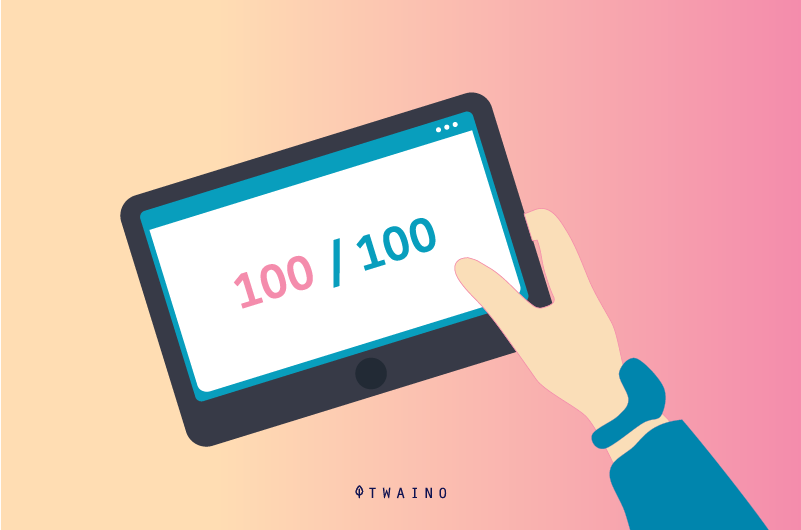
Tatiana Morand confirms this by saying:
”I try to include outbound links in my content to back up my arguments with evidence and outside opinions. I feel that this makes the piece stronger and gives it more authority
Plus, it shows both Google and readers that we’ve done our research on the topic and aren’t basing it solely on our own opinions.”
Another way outbound links can bring value to content creation teams is the relationship currency they offer.
3.1.4. Outbound links enhance domain relevance
To help searchers in the best possible way, search engines have learned to understand how different topics are related to each other and they are skilled enough to distinguish irrelevant content that it is linked to
That said, when you support a statement with an external link to a source that is fairly relevant to the subject matter of your content, the authority of that source tends to impact yours when the number of links becomes significant.
In addition, anchor texts that are comprehensive and relevant enough can not only help readers understand what they will get if they follow the link, but also provide additional search keywords for you.
In fact, anchor texts are signals to help search engines determine which keyword phrases your page should rank for.
In addition to this, a link from a relevant website in your industry provides more targeted data for the search engines.
This does not necessarily mean that all links from irrelevant sites are worthless. It is very common to acquire links from websites that are not directly related to your business or industry
These may be news sources, companies in other industries that you have partnered with, or a blog post that is tangentially relevant to your industry.
In addition, Google has an algorithm that evaluates the freshness of a page by taking into account the overall volume of newly published content on a given topic, so when you reference the most recent information, it boosts your relevance.
3.1.5. Link location on the page helps authority
The location of the link on a page can also have a lot of impact on the domain authority.
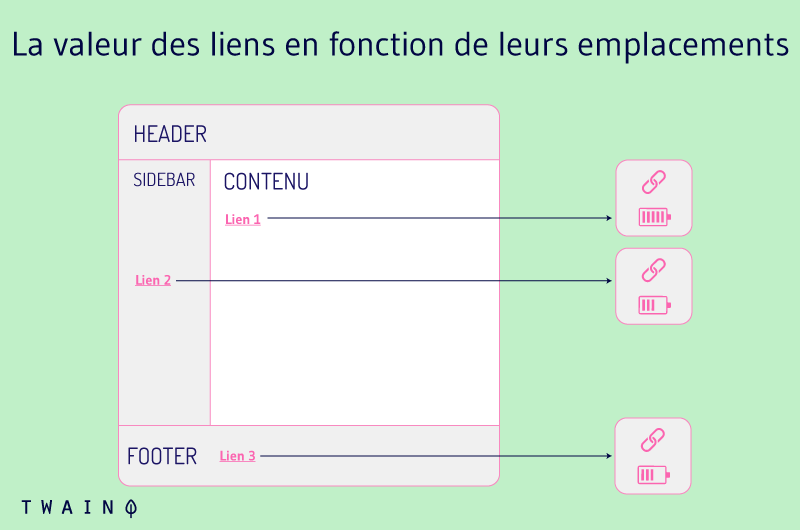
Although it is not obvious enough these days, in the past, search engines gave more weight to links that are placed higher on the page
This is not so much the case today, but there is one big exception: site-wide links pointing to your website.
However, scaled links can still impact your domain authority both positively and negatively.
Site-wide links are those that can be placed on every page and anywhere on the page like the footer or sidebar.
These are not inherently bad, but if not managed properly, they can be a clear sign to search engines that you are trying to manipulate search results via link building.
You will often see site-wide links in the footer of a website with something like ”Website provided by [Company]”
The best way to handle them is to make sure they have a ”nofollow” HTML tag included with them that tells search engines to exclude that link when determining the link strength of a website.
3.2. The negative impacts
Outbound links do not always have a positive effect on the authority of the domain, therefore, on SEO
As mentioned earlier, outbound links are harmful when you create them to spammy and bad reputation sites or when you clearly engage in black hat linking practices.
Negative outbound linking practices include:
3.2.1. Links to irrelevant and spam websites
Whenever you add links to your content, you certainly make sure to avoid redirecting your visitors to websites containing spam because it can damage your credibility.
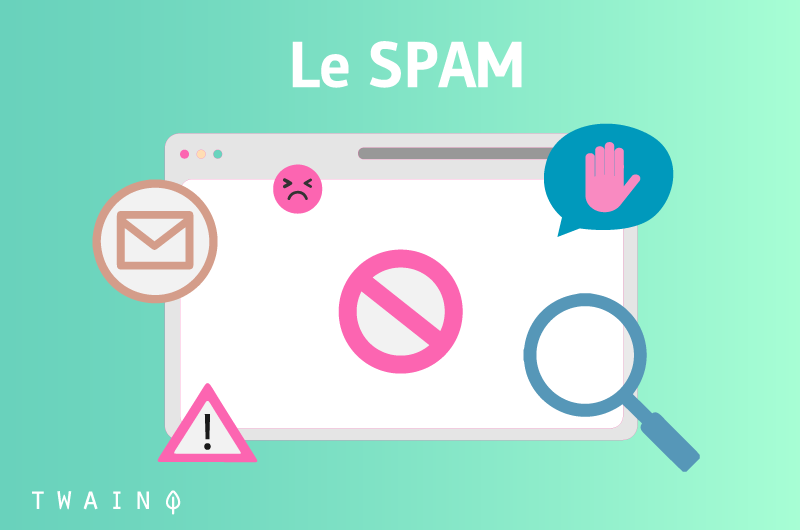
But, when it is another irrelevant source that quotes you, i.e. an inbound link, the website owner will probably not ask for your permission. That said, these links can hurt your site if you stand by and do nothing
But when you are the one creating outbound links, search engines look at the websites that your links go to in order to understand what industry you are in
So, if you link to irrelevant sites or pages, your page can lose a lot of authority.
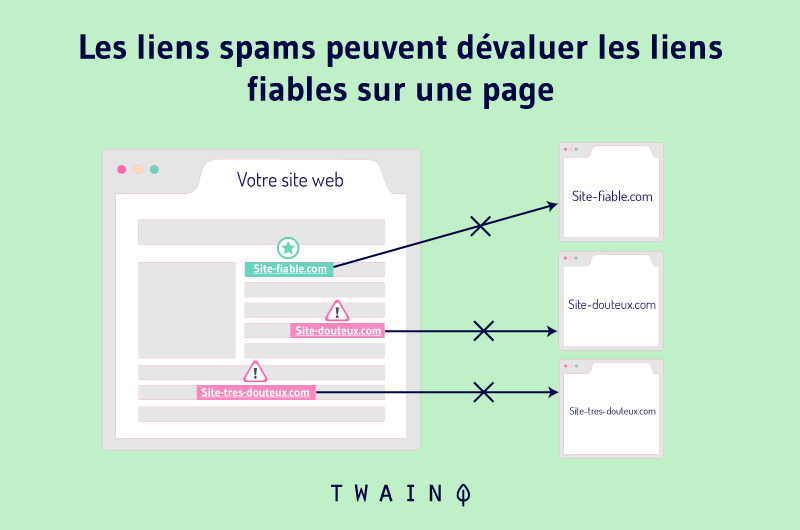
This, in turn, will reduce your search rankings for the relevant search queries you should have been ranking for.
3.2.2. Using link farms
Some people ask for links in exchange for links. These people contact websites to create link farms
But, what they don’t realize is that search engines can recognize these patterns. If two sites have too many links between them, search engines may consider this as manipulative.
Google’s Panda algorithm update put an end to this mutual link malfeasance by penalizing sites that had clearly built a harmful link building relationship
This suggests that link overload between two domains can result in severe search engine penalties.
Chapter 4: What external link factors promise high domain authority?
While it’s crucial to determine whether your potential source is worth considering, there’s still work to be done
In addition to your responsibility to provide reliable information to readers, it’s up to you to critically evaluate whether a given source is able to enhance the value and user experience of our content or damage it
Keep the following in mind:
4.1. Level of audience understanding
Let’s say you’ve dug into a trusted database like PubMed and found a fantastic source that will help you convince readers that an ingredient in your product is safe to swallow
You come across highly cited, recently published, and reviewed content that can really help support your point of view. Unfortunately, an advanced degree in biochemistry is needed to better understand your ideas.
In this case, despite the strength of the source, if your readers don’t have the knowledge to understand, you will likely leave them confused and concerned about your product or service
While it’s tempting to turn to scientific studies for great illustrations, you must keep in mind that the primary role of a source is to provide authority and context.
To put it bluntly, your website’s authority will be immediately questioned if your readers can’t understand it.
4.2. destination experience
If you think it’s great enough to keep your own site ultra-fast and ad-free, you need to look for those same qualities in your sources and referrers.
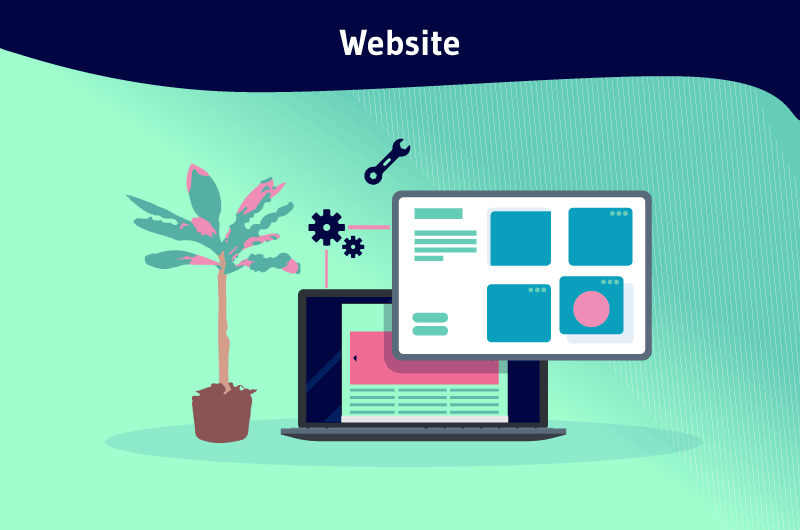
It’s really shocking for users to click on a link from a website that offers a better experience and be redirected to another site that not only loads very slowly, but also presents an interface full of ads.
Consider your link a reflection of its destination, because your readers absolutely do
4.3. Domain security
For the safety of your domain, you should avoid linking to sources that appear to be attacks.
While there’s no explicit penalty from Google against the kinds of links, it’s probably not great for SEO
For example, linking to a site that serves malware is a great way to lose public trust
If your browser shows a warning when you click on your source or fails Google’s security tool check, don’t use it.
4.4. Content balance
One problem that can create a bad user experience in sourcing is the tendency to link to extremely more detailed resources
Let’s say you write a ”Kloaking” blog about SEO and you quote a chapter from Moz’s Beginner’s Guide, an article that is over 5000 words long.
In truth, it’s a highly authoritative and relevant source to justify your views
Unfortunately, your hypothetical reader will have to read half of a 5,000+ word resource to find the information you want them to find and they may just decide to continue browsing Moz
Instead, a better option might simply be to link to the Google definition, as it’s a short, dedicated page with less chance of ending in a user bounce
Chapter 5: How to improve your authority score with external links?
Follow these tips that can help your domain become more authoritative.
5.1. Link to casual bloggers
Casual bloggers are referred to as beginners who are just starting their blogging journey. They usually have a lot of passion for their niche and are willing to learn as well as connect.
This is a great opportunity to build some pretty relevant links from publications and authority sites on your key pages.
Here’s how you can do it:
- First, it’s a good idea to join popular Facebook groups in your niche;
- Second, you need to be active especially when you first start in this forum.
Be helpful and above all, watch to see who are the other bloggers who contribute a lot;
- Third, make sure you have a good list of influencers in your space until you have gained a tiny bit of influence in your industry and with these people.
After these steps, it’s a good idea to spend a few hours of your time sharing their content, commenting on their blogs and engaging them in Facebook groups. You should do this for about 1-2 months.
Also, when you write new blog posts, always make sure to include some links to some of your new friends
Remember, the goal is to be helpful to them so that they remember you and your blog, and before you ask for anything in return.
This will serve as a way for you to get invited to raids in the first place and everyone will want to interview you
Interview links are great for building backlinks to commercial content. But the real value here is that you’ve built up a bank of gratitude that you can now use to strategically build links to your content.
5.2. Look for natural link opportunities
Creating a resource page with lots of outbound links is generally not a good idea, as links don’t always feel natural to readers.
Instead, look for opportunities to include relevant outbound links directly in your content
For example, if your content is based on a particular marketing tool, it would be interesting to redirect the reader to the marketplace where they can purchase the tool. This is useful for the users.
You can naturally include outbound links on your pages to explain technical references and provide additional insights
In addition, you can link to authority resources that contain more useful information on a particular topic or help clarify a point.
You can also include links to statistics and studies that illustrate your ideas in your content.
In April 2016, Google began imposing penalties on websites containing unnatural or irrelevant outbound links
The simple reason is that the artificial links were an attempt to manipulate the ranking of other websites, Google applied a manual anti-spam action to the affected websites.
Webmasters were asked to remove the questionable links or add nofollow tags to each.
5.3. Use descriptive anchor text
Anchor text is the underlined and highlighted text that you can click on to follow a link to another page.

When creating an outbound link, you should use descriptive keywords in the anchor text. You should avoid using the same keyword every time so as not to give the impression of spam.
However, it is better to use clear text that describes the topic or keywords contained on the target page. This will improve usability for users and search engines.
5.4. Look for local links
One of the best ways to gain local links to boost your authority is through local marketing.
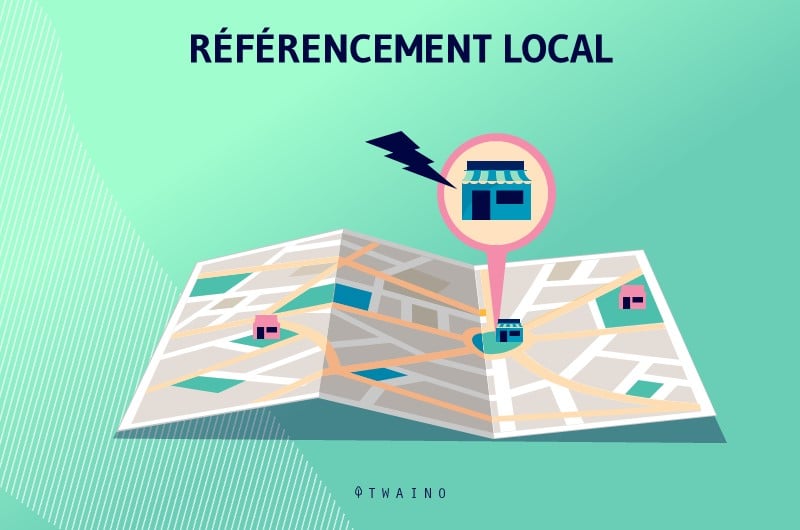
In previous years, business owners got involved in local SEO strategies in an effort to increase their visibility to local consumers
Today, this strategy of focusing more on local consumers has more benefits such as gaining inbound links from other local businesses, and allows for faster visibility to online customers.
If eventually you have already developed relationships with other businesses or organizations in your area, it would be even easier to leverage some of those connections and build a powerful collection of local links.
Here are some common link building tactics you can add to your local SEO strategy:
- Sponsor local events or organizations: it’s true that Google doesn’t approve of buying links and it can penalize you, but paying for sponsorships that drive links to your website is perfectly acceptable
- Look for golf tournaments, festivals or any other event in the area that needs local sponsors, then ask them to include your link on their website. You can even sponsor a little league team and get your logo on their jerseys in addition to their website for real-world visibility;
- Find out what your staff does outside of work: if you have people who work for you, try to find out more about their interests. It’s usually easy to get your company listed on other sites if your employees are already involved in local organizations, especially if they’re on the executive board;
- Support local charities: supporting local charities is a great way to draw more attention to your business while supporting a cause you care about. Look for opportunities to donate your time or services, such as feeding the homeless or cleaning up a local highway, and ask if the organizers can add your link to their website in return;
- Participate in local meetings: there are 2 common strategies for participating in local meetings. If you have a space that groups could use for their meetings, use a resource like meetup.com to find a local group that doesn’t yet have a permanent home. If you identify a group that matches your space, you can get a great local link from the group’s website and meetup.com. If you don’t have extra space available, look for groups that need monthly sponsors;
- Be featured on local blogs: if there are local bloggers who are popular with people in your area, contact them and ask them to write about your business. It’s even okay to offer them a free product or service in exchange for coverage, as they will write that they received something free for writing about you, but you will still receive a locally relevant link;
- Join local trade associations: this is a no-brainer. Trade association websites provide valuable local links, so if you have one in your area, it’s a great idea to join. Even if you’re not active in the group, you’ll still get the link and the SEO benefits that come with it.
- Get listed in local business directories: Many cities have local directories to help connect consumers with good businesses in the area. They are often divided into categories based on the type of business, but sometimes cities even have separate listings to highlight businesses run by women or people of different nationalities
So do some research to find out what type of directories exist in your city, then get your business listed in the ones that apply to you.
5.5. Gain traffic through authoritative content
Site-to-site links quickly drive visitors to websites while building credibility and increasing search engine optimization. Website-to-site links produce solid referrals
Just as you might recommend a local restaurant to a friend, websites use inbound links to drive their visitors to other useful websites.
However, not all links that land on your website have the same capacity or authority. An inbound link from a highly trusted and often visited website will produce more traffic than from an old blog post
But, in order to increase high-quality inbound links, your website must provide unique content that is useful enough for your target audience
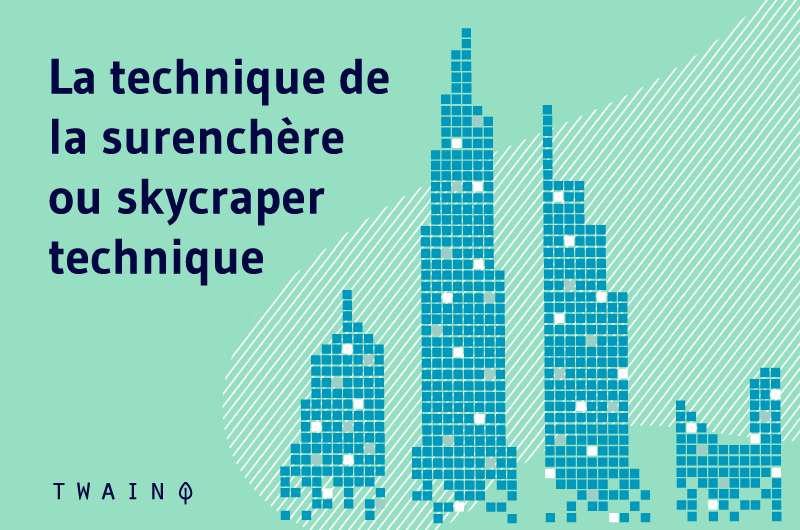
A great way to start is to publish a weekly blog post that answers frequently asked questions from your dealership’s customers
Target a different customer question each week and provide powerful answers in your content in order to give your pages a better chance of getting links from sites that will cite you.
Third-party websites will be more likely to link to your website content if you regularly publish information that their visitors find useful, such as product reviews and procedures.
When your website receives inbound links from credible third-party websites, your search engine ranking improves
A search engine’s goal is to rank the most relevant content at the top, so users can find it
As your site begins to accumulate inbound links, visitors will follow you as well as prospects.
So take the time to put your efforts into these additional tactics to produce more inbound links for your website:
- Submit to directories: This is your opportunity to list your website online and describe what your dealership has to offer potential customers. Start by submitting updated listings to Google Places for Business, Bing Places for Business and Yahoo Local;
- Publish on another website: Find another local business in your community that will allow you to guest post or blog on their website
A good place to reach out is a local newspaper or publication. These organizations have credibility and are always looking for community businesses to feature;
Remember, generating inbound links doesn’t happen overnight. It’s an ongoing process that requires constant effort to update your content, build local relationships and establish your credibility online.
5.6. Keep your authority high by avoiding external links on certain items
You must solemnly keep in mind that to ensure proper navigation, certain segments of your web pages cannot contain any external links at all naturally:
- Any navigational element: as the name suggests, they help users navigate a website and serve a seamless user experience.
- Elements hidden from users: hiding a link or part of the text of a link using CSS can be considered a manipulation game for search engines;
- Landing pages: when you’re trying to sell a product or service, you probably don’t want anything that takes visitors away from what you’re offering
The only thing you can link to is a rating platform like Clutch that features your profile with reviews.
Chapter 6: FAQs
6.1. How many external links per page?
When it comes to how many external links to include on a page for search engine optimization purposes, everyone gives their point of view
Of course, you know that you should include as many links as will be useful for your SEO, but too many can also hurt your authority.
In the past, you could not include more than 100 links because Google could not crawl more than that
But in the end, it was noticed that external links :
- Not useful if you only use one or two for a long page
- But very useful if you use about one external link every 400 or 500 words
- And less useful when you start inserting too many external links in your content, because Google then determines that you are trying to game its system.
According to a study, the question about the perfect number of outbound links per page often does not have a clear enough answer
A correlation was detected between the number of links and a page’s ranking, with the median number being 19, but it’s hard to be sure that these are the links that brought the pages to the top.
Obviously, creating more than 50 links for a medium-sized article is not a good idea. You should include as many links as a user can handle when reading or scrolling down the page.
The bottom line is that when you hyperlink to your fellow bloggers or favorite websites, it’s important to make sure you only do it when it’s necessary and provides truly factual information.
6.2. Who should you link to?
When it comes to who to link to for a high authority score, the short answer is to always try to link to the best authority on a topic.
Obviously, it would be quite helpful to connect to the ultimate authority, Google itself sometimes, whenever possible
It’s also a good idea to link to other experts like Wikipedia to back up your arguments on a specific topic.
When someone cites important resources like Google to clarify their ideas, readers are quickly likely to trust them. This trust is the reason Google decides to raise or lower your authority score.
This example, with Google itself as the authority, was certainly easier than what our lifestyle bloggers may encounter. Nevertheless, in any space, there are always established experts, even if they aren’t as well-known.
Consider them your peers if you are also considering being an expert. Consider external links as votes that will pay off in the long run.
6.3. External links to your website: What should they be?
To reduce the risk of being filtered by search engines when indexing, you need to monitor the quality of your external links and the websites they are placed on
Often, a high quality link should not contain purely commercial words in the anchor text, for example ”buy”, ”order”, ”price”
The link is organically placed in the text of the article to be appropriate in its meaning and useful for the user.
The donor’s website on which the links are placed must be of high quality and meet the following requirements:
- Belonging to the same sector where the website being promoted. Compliance with the condition is necessary for the projects to advance in the sector;
- The topics must be the same or similar;
- The absence of a large number of advertising media, banners and external links to other resources
- Good site traffic;
- The resource is not under the filters of search engines;
- It is desirable that the age of your domain is at least one year;
- When promoting a new website, the safest way to promote links is to place them without anchors. These include links in the form of text that is not considered an anchor. For example, ”here”, ”such”, ”there”, etc.
In addition to controlling the quality of links and donor sites, attention should be paid to forming the most diverse link profile.
For this purpose,
- Use a lot of different options for anchors, with a preference for unanchored links. Unanchored links refer to any spelling of the website address and company name, as well as queries that are not purely commercial
- Do not use many of the same commercial keywords in the anchors, as this is perceived by search engines as spam ;
- To be as natural as possible, apply the nofollow attribute in some links;
- Create links in the form of images;
- Build link popularity gradually, especially for new resources. It should also not be greatly reduced;
- Add links to forums and social networks.
To make sure that these recommendations are followed in the future and the backlinks are already indexed, you should check the external links to your website.
6.5. How to distinguish between natural and spam external links?
It all depends on what you consider useful and relevant to your website’s categories and topics
For example, if your site is focused on sports, it would make sense to link to other authoritative and relevant sports sites and pages that can enhance your visitors’ experience
Whereas including a link to a dentist’s office would seem rather less reasonable unless the link is legitimate.
Matt Cutts, former head of Google’s Webspam team, constantly urges webmasters to re-evaluate the quality of their sites
However, Matt himself admitted that ”The Web is changing, it’s evolving, in particular, web pages that have become much larger, there are more rich media and so it’s not uncommon to have aggregators or various things that could have many more links”.
6.6. How to find external links in a website
When you want a solid SEO strategy, you need solid external links
This includes the need to know how to find the ones you already have on your domain so you can track their effectiveness as needed.
In fact, Google itself offers many tools to allow you to do just that.
The company’s link analyzer allows you to track the number of external links you have on your site, shows you where they are, and helps you determine how beneficial they are to your search engine ranking
They even show you what percentage of your links are external and if the anchor text you are using is helpful.
Keep in mind that there are a wide range of link analysis tools on the market, some of which are free and some of which are paid
Before you stick with one Google checker, you may also want to consider trying others. You may find that another one (or even a combination of several tools) works better to meet your needs
If you use a content management system, such as WordPress, you can even use a popular plugin like Link Checker to track your internal and external links at the same time.
6.7. What do the experts say about the correlation between external links and domain authority?
Rand Fishkin, @randfish:
In August 2008, long-time link building advocate Rand Fishkin of Moz wrote about content that talked about why webmasters should link to other sites
His content supported the idea that by not linking to other authoritative websites, you could benefit from the potential link juice
Visitors can get value from the links you point to, and they can help support the credibility as well as association of your own site.
The following year, Fishkin wrote, ”I (and many other notable SEOs) have seen very compelling evidence suggesting that not only does link building not hurt a site’s rankings, but it seems to have positive correlations with rankings, trust, etc. both on a page and on a domain.”
After several algorithmic updates, both major and minor, Fishkin continued his support for external links by adding
”In terms of Google ruining natural links, I suspect this is an unintended side effect of their efforts here. They’re trying to do a good thing to show which links lead them to not trust websites
But when they mark editorial links as non-organic, they inadvertently scare site owners from making positive contributions to the Web by properly citing their work. That’s how you get a Google-shaped Web site, rather than a Web-shaped Google.”
On this subject, a UK-based SEO company The SEO Company speaks out saying, ”We believe that links to useful websites do not drive traffic away, quite the opposite in fact.”
For them, having external links excites visitors to come back to your site to find other interesting sources in the future.
Elisa Gabbert, @egabbert:
Unlike some, many other experts don’t even see link building as a concern for Google
Famous blogger Elisa Gabbert weighs in on the subject with these words
”As people continue to find more creative ways to build links, Google will have to redouble its efforts to sort out the good links from the bad ones
And I predict that the next iteration of Google or whatever search engine replaces it will not revolve around links, at least they will have much less weight in the algorithm as a ranking signal.”
James Agate, @jamesagate:
The link buildingsurvey conducted by James Agate of Skyrocket SEO shows that, despite all the confusion, external links are still important.
He estimates that an annual budget of $10,000 to $50,000 should be spent on external link building.
He concludes that “the fact remains that if you want to get big results with decent organic search visibility, you need external links.
Conclusion
Outbound links can have both positive and negative effects on SEO. It all depends on the linking practices you use.
So follow the best practices listed in this article and see the results for yourself.
If you know of other best practices that have worked for you, please share them with us in the comments below.

